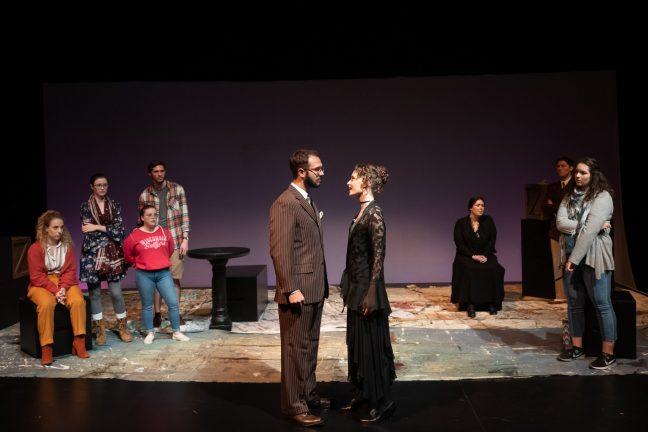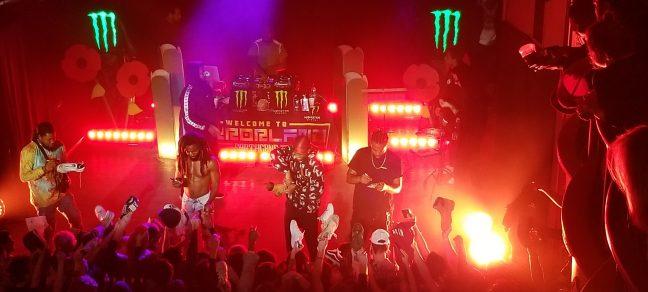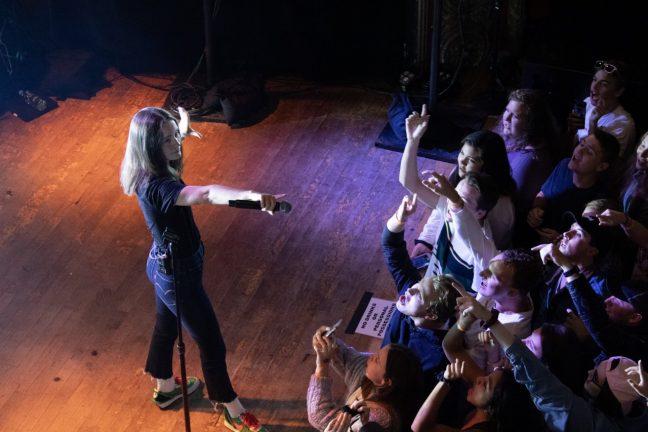Everything seemed normal as members of the audience flipped through their playbill waiting for the University Theater Association’s production of “Six Characters in Search of an Author” to begin.
As the audience patiently waited for the lights to dim, an ensemble of characters rushed hurriedly on the stage while subtly worrying about whether or not they would mess up their lines that night. Little did the crowd know, they were already part of the show.
The play began prefacing the theme of the show by teetering the audience on the edge of reality and production. One, nonchalantly and naturally, after the other, the cast members gathered on the stage.
‘Tangled’ presents diverse cast of models, designs from School of Human Ecology
They assembled not as actors, but simply as theatre students of the University of Wisconsin practicing in front of an unexpected audience. They explained they were only there to put together a show for a competition.
The actors and actresses had no idea why there was such a large group before them watching. Nevertheless, they started spitballing ideas leading to an entertaining improv routine. To the surprise of most in attendance, this included audience participation.
Slowly, a stoic and out-of-place man who clashed starkly with the playful energy of the student actor company, strode on stage introducing himself as the one in search of an author. Palpable confusion rippled through the cast members as well as the audience as he suddenly stripped away the red curtain backdrop revealing his family of unfinished characters.
With doubt, inquisition and struggle, the student actors gradually unraveled the make-shift story of these tragic characters. A constant thought-provoking clashing on traditional social values and perceptions of identity hand in hand with reality took place.
Why the Sinclair scripts decrying fake news are inherently hypocritical
The uninterrupted production was packed with refreshingly unorthodox drama and left some crying, laughing and at the edge of their seat. The strong student cast flourished under the experienced direction of David Kersnar accompanied by the input of Steve Moulds, author and adapter of Luigi Pirandello’s original Italian play.
Particularly impactful was the performance of Mallory Lewis, whose depiction of the pain-ridden journey of “the mother” rocked at least one member of the crowd to their core. Kyle Thompson’s authentic showing brought levity and meaning to this frequently disorienting play.
The performances of all those onstage were beautifully accented by the distinct period costumes by Gail Brassard. Often apparent was the synchronicity between sound designer Isabel Coff and lighting designer Alice Combs who provided much-needed context to sudden plot shifts that were common-place in the production.
In a direction process drawing connections to the greater symbolism of the play itself, Kersnar worked intimately with Moulds and the cast to craft an understandable frame for modern audiences.
‘Big Mouth’ provides comic relief among embarrassing, educational moments
The first week into the practice process, the student company was led through improvisation exercises and was directed to exaggerate forms of the ways each individual defined themselves in social circumstances, Kersnar detailed. The observations were sculpted into a script by Moulds fitting the original play, but featured the varied personalities of each actor.
In comparison, the family, represented by the actors as simply seeking someone to finish their story, were restricted only to the lines they were given. This concept stayed true to the original translation of the play.
Kersnar found the original work to be extremely hard to follow and noted that this process was instrumental in developing a new frame for the play to find meaning in the minds of contemporary audiences.
Through his work on the show, Kersnar found inspiration between the play’s questioning of identity and today’s obsession with cultivating hardly-realistic online characters through social media.
“We create these online visual avatars, whether we intend to or not, so we have created this pandemic of split personalities because of our screen addictions,” Kersnar said.
Kersnar wills audiences to be in the “here and now” and to set aside the commodification of social media status in an effort to acknowledge the fluidity of identity. Kersnar entertained an anecdote about how directors sometimes decide between equivalently talented actors by seeing which one has the most Twitter followers.
But there are also constant shifts in societal norms of what is acceptable to identify as in gender, sex, origin — the list goes on. Kersnar spoke on the anxiety surrounding our ability to identify as more things but how society is also trapped by a particular fear.
In a world where these two competing concepts of identity are consistently growing to new heights, “Six Characters in Search of an Author” finds the root and lays bare our conventional paranoia in an unconventional way.














